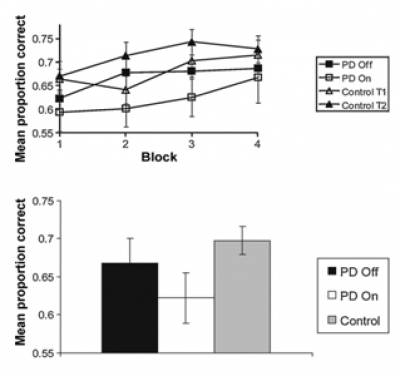Cognitive-Motor Neuroscience Group
Lab Head: Professor Marjan Jahanshahi
The resurgence of surgery as a treatment for movement disorders in the form of deep brain stimulation or lesioning of the subthalamic nucleus or the internal segment of the pallidum for Parkinson’s disease and other movement disorders provides a unique opportunity to investigate the contributions of the basal ganglia to cognition. We have demonstrated that DBS of the STN impairs learning of visual conditional associations and performance on tasks involving response conflict such as the Stroop (Jahanshahi et al, 2000) or response selection under competition such as fast-paced random number generation (Thobois et al, 2007), but improves set shifting and does not affect dual task performance (Page & Jahanshahi, 2007).
Examples of relevant publications
Jahanshahi M Ardouin C Brown RG Rothwell JC Obeso J Albanese A Rodriguez-Oroz MC Moro E Benabid AL Pollak P Limousin-Dowsey P (2000) The impact of deep brain stimulation on executive function in Parkinson’s disease. Brain, 123, 1142-1154.
Jahanshahi M Rowe J Saleem T Brown RG Limousin-Dowsey P Rothwell JC Thomas DGT Quinn NP (2002) Striatal contribution to cognition: Working memory and executive function in Parkinson’s disease before and after unilateral pallidotomy. J Cognitive Neuroscience, 14, 298-310.
Page D, Jahanshahi M (2007) Deep Brain Stimulation of the subthalamic nucleus improves set shifting but does not affect dual task performance in Parkinson’s disease IEEE Transactions on Neural Systems and Rehabilitation Engineering. Special Issue on DBS, Jun;15(2):198-206.
Thobois S Hotton G Pinto S Wilkinson L Limousin-Dowsey P Brooks D Jahanshahi M (2007) Deep brain stimulation of the subthalamic nucleus alters pallidal coupling with prefrontal cortex during response selection under competition. J Cerebral Blood Flow & Metabolism, Jun;27(6):1173-84.
Jahanshahi M, Wilkinson L, Gahir H, Dharminda A, Lagnado DA (2010) Medication Impairs Probabilistic Classification Learning in Parkinson’s Disease, Neuropsychologia; 48(4):1096–1103.
Jahanshahi et al (2010) Neuropsychologia, 1096–1103.
 |
 Close
Close

